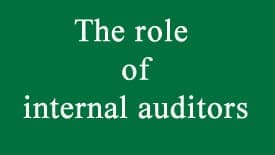Internal auditors wear many ‘hats’

The internal audit profession is interesting and dynamic. A challenge of the profession is to promote the role of internal auditor, while defeating misperceptions associated with this job.
The “old” internal auditor often was seen as a “bean counter” who was concerned with numbers or dollars and cents. Auditors were perceived as always looking back, and they emphasized finding fault.
However, the 21st-century internal auditor focuses on processes and systematic concerns; today’s auditors have perspectives that are future-oriented, and they focus on assessing, advising and assisting their organizations.
“As fellow University employees, we define success by helping you do your job more effectively and more efficiently,” said UNC Charlotte internal auditor Julie Earls. “We can do this by providing assurance, insight and objectivity from our unique perspectives and independent positions within the University.”
UNC Charlotte internal auditors collaborate with campus units and perform various roles; they are a(n):
- Coach
- Advocate
- Risk manager
- Controls expert
- Efficiency specialist
- Problem-solving partner
According to Earls, internal auditors are guided by 10 key principles of their profession:
- Demonstrates integrity
- Demonstrates competence and due professional care
- Is objective and free from undue influence (independent)
- Aligns with the strategies, objectives and risks of the organization
- Is appropriately positioned and adequately resourced
- Demonstrates quality and continuous improvement
- Communicates effectively
- Provides risk-based assurance
- Is insightful, proactive and future-focused
- Promotes organizational improvement